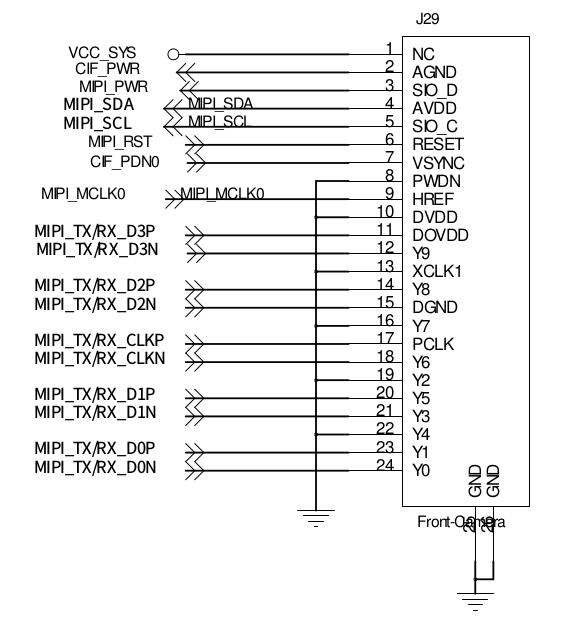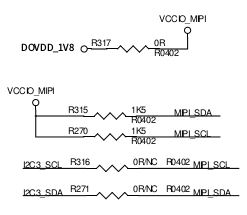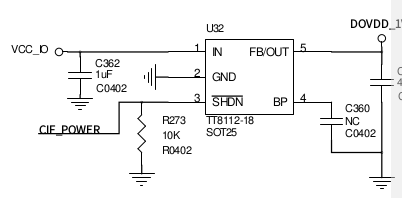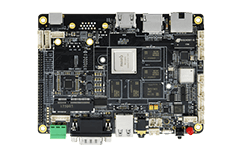6. MIPI CSI Use¶
6.1. Onboard resources¶
The AIO-3288C development board has the MIPI camera interface. The camera’s image processing capability reaches 4416x3312 pixels and supports 4K video recording. In addition, the development board also supports a USB camera.
This article takes the OV13850 camera as an example to explain the configuration process of the MIPI camera on the development board.
6.3. Configuration principles¶
Set camera-related pin and clock to complete the configuration process.
According to the schematic diagram of camera port below, the pins to be configured include: CIF_PWR, MIPI_PWR, MIPI_SDA, MIPI_SCL, MIPI_RST and CIF_PDN0.

CIF_PWR corresponds to GPIO7_B4 pin on AIO-3288C:

MIPI_PWR and MIPI_RST correspond to GPIO3_B2 and GPIO3_B0 pins on AIO-3288C, the default of which is high level:

MIPI_SDA and MIPI_SCL are controlled by CIF_PWR:


CIF_PDN0 corresponds to GPIO2_B6 pin:

In the development board, except for CIF_POWER and DVP_POWER which shall be set on DTS and driver, the other pins shall be set on {AND_MIPI_CSI_XML}.
6.4. Configuration steps¶
6.4.1. Configure Android¶
Modify hardware/rockchip/camera/Config/cam_board_rk3288_aio-3288c.xml to register camera:
<?xml version="1.0" ?>
<BoardFile>
<BoardXmlVersion version="v0.7.0">
</BoardXmlVersion>
<CamDevie>
<HardWareInfo>
<Sensor>
<SensorName name="OV13850" ></SensorName>
<SensorDevID IDname="CAMSYS_DEVID_SENSOR_1B"></SensorDevID>
<SensorHostDevID busnum="CAMSYS_DEVID_MARVIN" ></SensorHostDevID>
<SensorI2cBusNum busnum="3"></SensorI2cBusNum>
<SensorI2cAddrByte byte="2"></SensorI2cAddrByte>
<SensorI2cRate rate="100000"></SensorI2cRate>
<SensorMclk mclk="24000000"></SensorMclk>
<SensorAvdd name="NC" min="0" max="0"></SensorAvdd>
<SensorDovdd name="NC" min="18000000" max="18000000"></SensorDovdd>
<SensorDvdd name="NC" min="0" max="0"></SensorDvdd>
<SensorGpioPwdn ioname="RK30_PIN2_PB6" active="0"></SensorGpioPwdn>
<SensorGpioRst ioname="RK30_PIN3_PB0" active="0"></SensorGpioRst>
<SensorGpioPwen ioname="RK30_PIN0_PB3" active="1"></SensorGpioPwen>
<SensorFacing facing="front"></SensorFacing>
<SensorInterface interface="MIPI"></SensorInterface>
<SensorMirrorFlip mirror="0"></SensorMirrorFlip>
<SensorOrientation orientation="0"></SensorOrientation>
<SensorPowerupSequence seq="1234"></SensorPowerupSequence>
<SensorFovParemeter h="60.0" v="60.0"></SensorFovParemeter>
<SensorAWB_Frame_Skip fps="15"></SensorAWB_Frame_Skip>
<SensorPhy phyMode="CamSys_Phy_Mipi" lane="2" phyIndex="1" sensorFmt="CamSys_Fmt_Raw_10b"></SensorPhy>
</Sensor>
<VCM>
<VCMDrvName name="BuiltInSensor"></VCMDrvName>
<VCMName name="NC"></VCMName>
<VCMI2cBusNum busnum="3"></VCMI2cBusNum>
<VCMI2cAddrByte byte="0"></VCMI2cAddrByte>
<VCMI2cRate rate="0"></VCMI2cRate>
<VCMVdd name="NC" min="0" max="0"></VCMVdd>
<VCMGpioPwdn ioname="NC" active="0"></VCMGpioPwdn>
<VCMGpioPower ioname="NC" active="0"></VCMGpioPower>
<VCMCurrent start="20" rated="80" vcmmax="100" stepmode="13" drivermax="100"></VCMCurrent>
</VCM>
<Flash>
<FlashName name="Internal"></FlashName>
<FlashI2cBusNum busnum="0"></FlashI2cBusNum>
<FlashI2cAddrByte byte="0"></FlashI2cAddrByte>
<FlashI2cRate rate="0"></FlashI2cRate>
<FlashTrigger ioname="NC" active="0"></FlashTrigger>
<FlashEn ioname="NC" active="0"></FlashEn>
<FlashModeType mode="1"></FlashModeType>
<FlashLuminance luminance="0"></FlashLuminance>
<FlashColorTemp colortemp="0"></FlashColorTemp>
</Flash>
</HardWareInfo>
<SoftWareInfo>
<AWB>
<AWB_Auto support="1"></AWB_Auto>
<AWB_Incandescent support="1"></AWB_Incandescent>
<AWB_Fluorescent support="1"></AWB_Fluorescent>
<AWB_Warm_Fluorescent support="1"></AWB_Warm_Fluorescent>
<AWB_Daylight support="1"></AWB_Daylight>
<AWB_Cloudy_Daylight support="1"></AWB_Cloudy_Daylight>
<AWB_Twilight support="1"></AWB_Twilight>
<AWB_Shade support="1"></AWB_Shade>
</AWB>
<Sence>
<Sence_Mode_Auto support="1"></Sence_Mode_Auto>
<Sence_Mode_Action support="1"></Sence_Mode_Action>
<Sence_Mode_Portrait support="1"></Sence_Mode_Portrait>
<Sence_Mode_Landscape support="1"></Sence_Mode_Landscape>
<Sence_Mode_Night support="1"></Sence_Mode_Night>
<Sence_Mode_Night_Portrait support="1"></Sence_Mode_Night_Portrait>
<Sence_Mode_Theatre support="1"></Sence_Mode_Theatre>
<Sence_Mode_Beach support="1"></Sence_Mode_Beach>
<Sence_Mode_Snow support="1"></Sence_Mode_Snow>
<Sence_Mode_Sunset support="1"></Sence_Mode_Sunset>
<Sence_Mode_Steayphoto support="1"></Sence_Mode_Steayphoto>
<Sence_Mode_Pireworks support="1"></Sence_Mode_Pireworks>
<Sence_Mode_Sports support="1"></Sence_Mode_Sports>
<Sence_Mode_Party support="1"></Sence_Mode_Party>
<Sence_Mode_Candlelight support="1"></Sence_Mode_Candlelight>
<Sence_Mode_Barcode support="1"></Sence_Mode_Barcode>
<Sence_Mode_HDR support="1"></Sence_Mode_HDR>
</Sence>
<Effect>
<Effect_None support="1"></Effect_None>
<Effect_Mono support="1"></Effect_Mono>
<Effect_Solarize support="1"></Effect_Solarize>
<Effect_Negative support="1"></Effect_Negative>
<Effect_Sepia support="1"></Effect_Sepia>
<Effect_Posterize support="1"></Effect_Posterize>
<Effect_Whiteboard support="1"></Effect_Whiteboard>
<Effect_Blackboard support="1"></Effect_Blackboard>
<Effect_Aqua support="1"></Effect_Aqua>
</Effect>
<FocusMode>
<Focus_Mode_Auto support="1"></Focus_Mode_Auto>
<Focus_Mode_Infinity support="1"></Focus_Mode_Infinity>
<Focus_Mode_Marco support="1"></Focus_Mode_Marco>
<Focus_Mode_Fixed support="1"></Focus_Mode_Fixed>
<Focus_Mode_Edof support="1"></Focus_Mode_Edof>
<Focus_Mode_Continuous_Video support="0"></Focus_Mode_Continuous_Video>
<Focus_Mode_Continuous_Picture support="1"></Focus_Mode_Continuous_Picture>
</FocusMode>
<FlashMode>
<Flash_Mode_Off support="1"></Flash_Mode_Off>
<Flash_Mode_On support="1"></Flash_Mode_On>
<Flash_Mode_Torch support="1"></Flash_Mode_Torch>
<Flash_Mode_Auto support="1"></Flash_Mode_Auto>
<Flash_Mode_Red_Eye support="1"></Flash_Mode_Red_Eye>
</FlashMode>
<AntiBanding>
<Anti_Banding_Auto support="1"></Anti_Banding_Auto>
<Anti_Banding_50HZ support="1"></Anti_Banding_50HZ>
<Anti_Banding_60HZ support="1"></Anti_Banding_60HZ>
<Anti_Banding_Off support="1"></Anti_Banding_Off>
</AntiBanding>
<HDR support="1"></HDR>
<ZSL support="1"></ZSL>
<DigitalZoom support="1"></DigitalZoom>
<Continue_SnapShot support="1"></Continue_SnapShot>
<PreviewSize width="800" height="600"></PreviewSize>
<DV>
<DV_QCIF name="qcif" width="176" height="144" fps="10" support="1"></DV_QCIF>
<DV_QVGA name="qvga" width="320" height="240" fps="10" support="1"></DV_QVGA>
<DV_CIF name="cif" width="352" height="288" fps="10" support="1"></DV_CIF>
<DV_VGA name="480p" width="640" height="480" fps="10" support="0"></DV_VGA>
<DV_480P name="480p" width="720" height="480" fps="10" support="0"></DV_480P>
<DV_720P name="720p" width="1280" height="720" fps="10" support="1"></DV_720P>
<DV_1080P name="1080p" width="1920" height="1080" fps="10" support="1"></DV_1080P>
</DV>
</SoftWareInfo>
</CamDevie>
</BoardFile>
The main modified contents are as follows:
Sensor name
<SensorName name="OV13850" ></SensorName>
This name must coincide to the name of Sensor driver, and the format of Sensor driver currently provided is as follows:
libisp_isi_drv_OV13850.so
The user can find the driver file of this camera under the catalog out/target/product/rk3288_aio_3288j_box/system/lib/hw/ after completing Android compilation.
Sensor software identification
<SensorDevID IDname="CAMSYS_DEVID_SENSOR_1A"></SensorDevID>
Any inconsistent registration identification is okay, the following value can be filled in:
CAMSYS_DEVID_SENSOR_1A
CAMSYS_DEVID_SENSOR_1B
CAMSYS_DEVID_SENSOR_2
Name of acquisition controller
<SensorHostDevID busnum="CAMSYS_DEVID_MARVIN" ></SensorHostDevID>
At present, it only supports:
CAMSYS_DEVID_MARVIN
Number of I2C channel connected to master control of Sensor
<SensorI2cBusNum busnum="3"></SensorI2cBusNum>
For the specific channel number, please refer to the number of I2C channel connected to master control on the schematic diagram of camera.
Sensor register address size, unit: bytes
<SensorI2cAddrByte byte="2"></SensorI2cAddrByte>
I2C frequency of Sensor, unit: Hz, which is used for setting I2C frequency.
<SensorI2cRate rate="100000"></SensorI2cRate>
Sensor input clock frequency, unit: Hz, which is used for setting camera clock.
<SensorMclk mclk="24000000"></SensorMclk>
PMU LDO name of Sensor AVDD. If it cannot be connected to PMU, fill in NC only.
<SensorAvdd name="NC" min="0" max="0"></SensorAvdd>
PMU LDO name of Sensor DOVDD.
<SensorDovdd name="NC" min="18000000" max="18000000"></SensorDovdd>
If it is not connected to PMU, fill in NC only. The values of min and max must be filled in, which decide the IO voltages of Sensor.
PMU LDO name of Sensor DVDD.
<SensorDvdd name="NC" min="0" max="0"></SensorDvdd>
If it is not connected to PMU, fill in NC only.
Sensor PowerDown pin.
<SensorGpioPwdn ioname="RK30_PIN2_PB6" active="0"></SensorGpioPwdn>
Directly fill in the name, and fill in the active level of sleep in active field.
Sensor Reset pin.
<SensorGpioRst ioname="RK30_PIN3_PB0" active="0"></SensorGpioRst>
Directly fill in the name, and fill in the active level of reset in active field.
Sensor Power pin.
<SensorGpioPwen ioname="RK30_PIN0_PB3" active="1"></SensorGpioPwen>
Directly fill in the name, and fill in the active level of power in active field.
Select front or back for the Sensor.
<SensorFacing facing="front"></SensorFacing>
“Front” or “back” can be filled in.
Sensor interface mode
<SensorInterface mode="MIPI"></SensorInterface>
The following value can be filled in:
CCIR601
CCIR656
MIPI
SMIA
Sensor image mode
<SensorMirrorFlip mirror="0"></SensorMirrorFlip>
Do not support at present.
Sensor angle information
<SensorOrientation orientation="0"></SensorOrientation>
Physical interface settings
MIPI
<SensorPhy phyMode="CamSys_Phy_Mipi" lane="2" phyIndex="1" sensorFmt="CamSys_Fmt_Raw_10b"></SensorPhy>
phyMode: Sensor port hardware connection mode, for MIPI Sensor, this value shall take “CamSys_Phy_Mipi”
lane: number of data channels in Sensor mipi interface
phyIndex: mipi phy number of master control connected to Sensor mipi
sensorFmt: Sensor output data format, which only supports CamSys_Fmt_Raw_10b at present
6.4.2. Configuration kernel¶
The configuration principles mention that GPIO7_B4 should be configured in DTS and driver. The configuration methods are as follows:
(1). Add GPIO7_B4 configuration properties in DTS file
Add gpios-cifpower property in kernel/arch/arm/boot/dts/rk3288.dtsi file, as shown below:
isp: isp@ff910000{
compatible = "firefly,isp";
...
gpios-cifpower = ;
...
status = "okay";
};
(2). Configure CIF_POWER in driver
Read gpios-cifpower in kernel/drivers/media/video/rk_camsys/camsys_drv.c, set this pin, enable CIF_POWER, and add in probe function camsys_platform_probe(), as shown below:
enum of_gpio_flags flags;
int cifpower_io;
int io_ret;
cifpower_io = of_get_named_gpio_flags(dev->of_node, "gpios-cifpower", 0, &flags);
camsys_trace(1, "1-gpios-cifpower: gpio=%d", cifpower_io);
if(gpio_is_valid(cifpower_io)){
cifpower_io = of_get_named_gpio_flags(dev->of_node, "gpios-cifpower", 0, &flags);
camsys_trace(1, "gpios-cifpower: gpio_request");
io_ret = gpio_request(cifpower_io,"cifpower");
camsys_trace(1, "1-gpios-cifpower: gpio_request=%d", io_ret);
if(io_ret < 0){
camsys_err("Request %s(%d) failed","cifpower", cifpower_io);
}
else{
gpio_direction_output(cifpower_io, 1);
gpio_set_value(cifpower_io, 1);
camsys_trace(1, "gpios-cifpower: %d high", cifpower_io);
}
}
(3). Compile kernel
Compile the driver source code drivers/media/video/rk_camsys into the kernel; its configuration methods are as follows:
Execute command under kernel source code catalog:
make menuconfig
Then, open the following configuration item:
Device Drivers --->
Multimedia support --->
camsys driver
RockChip camera system driver --->
camsys driver for marvin isp
camsys driver for cif
Finally, execute:
make firefly-rk3288-aio-3288c.img
The compilation of kernel is completed.
